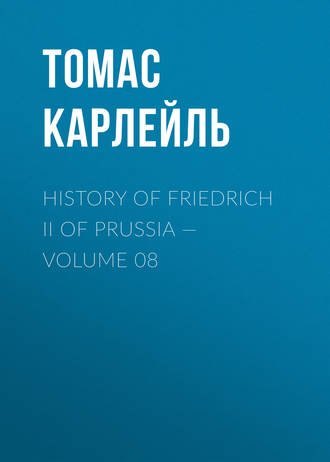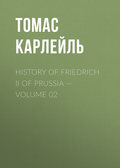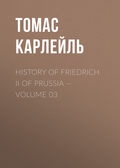
Томас Карлейль
History of Friedrich II of Prussia — Volume 08
"The first sane step was to throw myself at the feet of the King: King said, 'Are you content with me? You see I have kept my word!' I took my Brother by the hand; and entreated the King to restore him his friendship. This scene was so touching, it drew tears from the eyes of everybody. I then approached the Queen. She was obliged to embrace me, the King being close opposite; but I remarked that her joy was only affected."—Why then, O Princess? Guess, if you can, the female humors of her Majesty!—
"I turned to my Brother again; I gave him a thousand caresses, and said the tenderest things to him: to all which he remained cold as ice, and answered only in monosyllables. I presented the Prince (my Husband); to whom he did not say one word. I was astonished at this fashion of procedure! But I laid the blame of it on the King, who was observing us, and who I judged might be intimidating my Brother. But even his countenance surprised me: he wore a proud air, and seemed to look down on everybody."
A much-changed Crown-Prince. What can be the meaning of it? Neither King nor he appeared at supper: they were supping elsewhere, with a select circle; and the whisper ran among us, His Majesty was treating him with great friendliness. At which the Queen, contrary to hope, could not conceal her secret pique. "In fact," says Wilhelmina, again too hard on Mamma, "she did not love her children except as they served her ambitious views." The fact that it was I, and not she, who had achieved the Prince's deliverance, was painful to her Majesty: alas, yes, in some degree!
"Ball having recommenced, Grumkow whispered to me, 'That the King was pleased with my frank kind ways to my Brother; and not pleased with my Brother's cold way of returning it: Does he simulate, and mean still to deceive me? Or IS that all the thanks he has for Wilhelmina? thinks his Majesty. Go on with your sincerity, Madam; and for God's sake admonish the Crown-Prince to avoid finessing!' Crown-Prince, when I did, in some interval of the dance, report this of Grumkow, and say, Why so changed and cold, then, Brother of my heart? answered, That he was still the same; and that he had his reasons for what he did." Wilhelmina continues; and cannot understand her Crown-Prince at all:—
"Next morning, by the King's order, he paid me a visit. The Prince," my Husband, "was polite enough to withdraw, and left me and Sousfeld alone with him. He gave me a recital of his misfortunes; I communicated mine to him,"—and how I had at last bargained to get him free again by my compliance. "He appeared much discountenanced at this last part of my narrative. He returned thanks for the obligations I had laid on him,—with some caressings, which evidently did not proceed from the heart. To break this conversation, he started some indifferent topic; and, under pretence of seeing my Apartment, moved into the next room, where the Prince my Husband was. Him he ran over with his eyes from head to foot, for some time; then, after some constrained civilities to him, went his way. "What to make of all this?" Madam Sonsfeld shrugged her shoulders; no end of Madam Sousfeld's astonishment at such a Crown-Prince.
Alas, yes, poor Wilhelmina; a Crown-Prince got into terrible cognizance of facts since we last met him! Perhaps already sees, not only what a Height of place is cut out for him in this world, but also in a dim way what a solitude of soul, if he will maintain his height? Top of the frozen Schreckhorn;—have you well considered such a position! And even the way thither is dangerous, is terrible in this case. Be not too hard upon your Crown-Prince. For it is certain he loves you to the last!
Captain Dickens, who alone of all the Excellencies was not at the Wedding,—and never had believed it would be a wedding, but only a rumor to bring England round,—duly chronicles this happy reappearance of the Prince-Royal: "about six, yesterday evening, as the company was dancing,—to the great joy and surprise of the whale Court;"—and adds: "This morning the Prince came to the public Parade; where crowds of people of all ranks flocked to see his Royal Highness, and gave the most open demonstrations of pleasure." [Despatch 24th November, 1731.]
Wilhelmina, these noisy tumults, not all of them delightful, once done, gets out of the perplexed hurly-burly, home towards still Baireuth, shortly after New-year. [11th January, 1732 (Wilhelmina, ii. 20.] "Berlin was become as odious to me as it had once been dear. I flattered myself that, renouncing grandeurs, I might lead a soft and tranquil life in my new Home, and begin a happier year than the one that had just ended." Mamma was still perverse; but on the edge of departure Wilhelmina contrived to get a word of her Father, and privately open her heart to him. Poor Father, after all that has come and gone:—
"My discourse produced its effect; he melted into tears, could not answer me for sobs; he explained his thoughts by his embracings of me. Making an effort, at length, he said: 'I am in despair that I did not know thee. They had told me such horrible tales, I hated thee as much as I now love thee. If I had addressed myself direct to thee, I should have escaped much trouble, and thou too. But they hindered me from speaking; said thou wert ill-natured as the Devil, and wouldst drive me to extremities I wanted to avoid. Thy Mother, by her intriguings, is in part the cause of the misfortunes of the family; I have been deceived and duped on every side. But my hands are tied; and though my heart is torn in pieces, I must leave these iniquities unpunished!'"—The Queen's intentions were always good, urged Wilhelmina. "Let us not enter into that detail," answered he: "what is past is past; I will try to forget it;" and assured Wilhelmina that she was the dearest to him of the family, and that he would do great things for her still,—only part of which came to effect in the sequel. "I am too sad of heart to take leave of you," concluded he: "embrace your Husband on my part; I am so overcome that I must not see him." [Wilhelmina, ii. 4; who dates 11th January, 1732.] And so they rolled away.
Crown-Prince was back to Custrin again, many weeks before. Back to Custrin; but under totally changed omens: his history, after that first emergence in Wilhelmina's dance "23d November about six P.M.," and appearance at Parade on the morrow (Saturday morning), had been as follows. (Monday November 26th) there was again grand Ball, and the Prince there, not in gray this time. Next day, the old Dessauer and all the higher Officers in Berlin petitioned, "Let us have him in the Army again, your Majesty!" Majesty consented: and so, Friday, 30th, there was grand dinner at Seckendorf's, Crown-Prince there, in soldier's uniform again; a completely pardoned youth. His uniform is of the Goltz Regiment, Infantry: Goltz Regiment, which lies at Ruppin,—at and about, in that moory Country to the Northeast, some thirty or forty miles from Berlin;—whither his destination now is.
Crown-Prince had to resume his Kammer work at Custrin, and see the Buildings at Carzig, for a three months longer, till some arrangements in the Regiment Goltz were perfected, and finishing improvements given to it. But "on the last day of February" (29th) (1732 being leap-year), his Royal Highness's Commission to be Colonel Commandant of said Regiment is made out; and he proceeds, in discharge of the same, to Ruppin, where his men lie. And so puts off the pike-gray coat, and puts on the military blue one, [Preuss, i. 69.]—never to quit it again, as turned out.
Ruppin is a little Town, in that northwest Fehrbellin region: Regiment Goltz had lain in detached quarters hitherto; but is now to lie at Ruppin, the first Battalion of it there, and the rest within reach. Here, in Ruppin itself, or ultimately at Reinsberg in the neighborhood, was Friedrich's abode, for the next eight years. Habitual residence: with transient excursions, chiefly to Berlin in Carnival time, or on other great occasions, and always strictly on leave; his employment being that of Colonel of Foot, a thing requiring continual vigilance and industry in that Country. Least of all to be neglected, in any point, by one in his circumstances. He did his military duties to a perfection satisfactory even to Papa; and achieved on his own score many other duties and improvements, for which Papa had less value. These eight years, it is always understood, were among the most important of his life to him.







